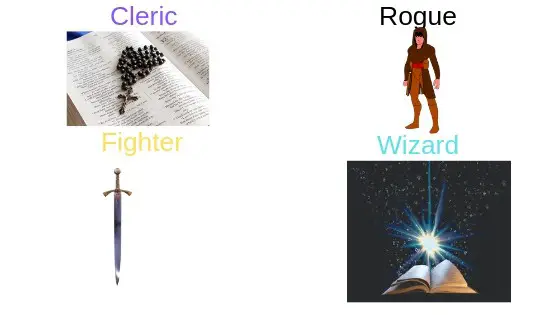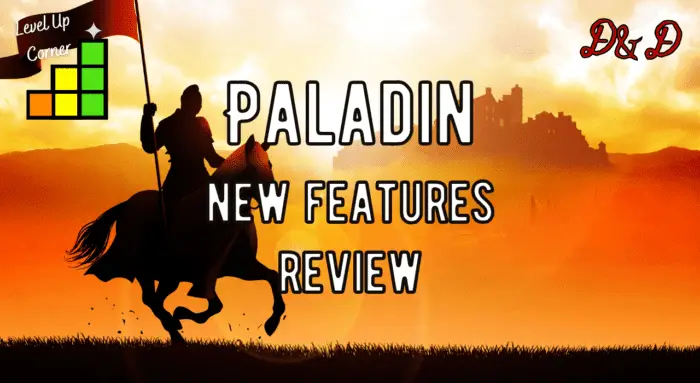When a new player comes to the table and is eager to play the question will come up ‘which class should I play in D&D?’ Sometimes people
Is choosing a class really that easy?
What about experienced players who just cannot decide what class they want to play? A chart will not help you in this instance, and a chart doesn’t have enough detail in order for you to like the class you picked.
Don’t use a chart. “Which class should I play in D&D?” is an organic process. Make a background, develop the person, THEN chose a class, and play what you want.
Making a character’s life
We all have to start somewhere, and you should start by picking a race. Once a race is picked, you will go through the steps below in order to create an amazing character which you will love!
Background
The dungeon master always tells us to give them a background for our character. If your dungeon master doesn’t do this, they should because it makes their life easier. The game now can be directly influenced by your character’s experience, background, and gives you a personal stake in the game. All of these are good reasons why the dungeon master should force you to make a backstory, but what about you? What do you directly get out of it?
Instead of waiting for the dungeon master to find a purpose for your character, you can take charge. Was your character born rich, poor, or middle class? What does that mean for your character? How did it shape your character’s beliefs and ideals?
Not every background has to be fantastical about how Timmy Jr. found an epic sword in a well that was a family heirloom with him being the last of a royal bloodline. Every character seems to have a ridiculous background, but that is not the point of backgrounds. Backgrounds help us establish who the character is, and how they should be played.
Personality
We established that backgrounds are supposed to help you mold your character giving you a way to take charge instead of waiting for your dungeon master to do something, but that is not all a good background does. A good background causes the player to think, why did my character choose to do this action?
When you start to consider how circumstances affect your character, you can decide that character’s personality. Are they rich and snobby? Are they going to make trouble for everyone else? Do they have trust issues? And if so why? Why does my character act and feel this way?
This understanding helps you to connect to your character and make organic decisions. When we start with a class template and make a character based on that the character is forced to fit a pre-determined mold. This causes a weak character and a weak personality. Instead, let the personality shape the character that you are creating instead of the class.
Purpose
Now that your personality and background are set, how did your character get from that nice or hellish background to adventuring? If the background is hellish, like being raised by killer clowns, you have an obvious reason why the character would adventure. To go literally anywhere else!
If you have a character that had a great upbringing, you now must find some reason or conflict that character has to go adventuring. Perhaps their peers won’t accept that person until they have proven themselves. Either way, the character has to prep for adventure somehow.
A person raised by killer clowns might advance their roguish skills to sneak away while a goodie too shoes might be a law-abiding paladin. Find a class that organically fits your character and the class will become more interesting.
Determining class

I am a wizard. I love wizards, books, and being extremely nerdy in all regards. The only reason why I am not making money as a wizard in real life is that being a mage isn’t a viable career option. I played a wizard as my first character and it was fine, but that character was boring.
As a wizard, what do you think I would hate?
Instead of picking a class, I made a character by going through background and organically developing a personality. That person lived a hard life as a blacksmith’s son who always saw adventurer’s buying his dads stuff. As he grew up, he noticed this more and more. He noticed how the adventurers always had leftover gold and everyone else was poor. The choice was clear, he wanted to be an adventurer.
This caused my character to be a fighter, and I am naturally a wizard. Back to the question, what do you think I would hate?
To my surprise, the answer was not a melee fighter. This fighter noticed things around him and used them to his advantage. Therefore he would use the environment and try to solve disputes without fighting. Shocking I know, but he would utilize the resources of his party since he tried to learn everything that he could from adventurers passing through the shop. He was a tactician, and that made everything a lot more interesting.
I loved this character, and he instilled in me a love for fighters that I have never grown out of and find completely unnatural given my personal background as a wana be wizard.
Stats
Now if you are still stuck in making a character, your stats can be used as a guide. Let’s take my fighter for example. He did not have a lot of dexterity since he worked at a forge, but that gave him strength and constitution. Next, he was very intelligent and possibly wise from talking to and learning from adventurers. He was also charismatic, but this is where I had to make a decision.
Did he talk to people in order to get information or because he was gregarious? How successful was he? The answer to these questions determined if he was charismatic.
Next up is wisdom. Is it wise to go out and seek his fortune? He already knew about the danger of adventuring and how it was likely to get him killed, but he thought he could prevent it. Can you really prevent the unknown? Definitely not, so he probably wasn’t the wisest if greed was his motivator.
That leaves intelligence. What did he do with the information given? He surveyed the land, tried to find out how things worked, and even came up with tactics. That seems intelligent to me.
Thus his stat priority went strength, constitution, intelligence, charisma, wisdom, and finally dexterity. Having a clumsy fighter was a blast to role play.
Mechanics
Now the common complaint with this type of method is mechanics. “I don’t like how that class works” or “I don’t like being upfront in the fight.” Those are reasonable concerns, but you will not have them with this method.
In theory, you could make a character which you despise or would not like to play, but that will not happen.
If you make a character which you like, naturally you will be okay with how they fight since you freaking designed it! You stated how this person was a blacksmith, hunter, scholar, whatever it is, you did this.
Not many people, when told to create a character, will naturally create a character that they hate, and even if you end up fighting in a manner that you are unaccustomed to, the love you put into your character will negate con. Never once did I consider how ranged or magic is better when playing the blacksmith. Instead, I thought of what he would do and why he would do things. This made the game far more interesting, and I didn’t even consider playing a different way.
Focusing on and enjoying what you have negates the desire to want something different. Creating a character that you enjoy will naturally cause this to happen.
Party composition

Sometimes people are shoehorned into picking a class that they don’t want to play. When they ask which class should I play in D&D a class is forced on them for the sake of party composition.
I don’t buy into the whole idea that you
I have seen a party of pure wizards completely destroy a normal party. I have seen parties with no clerics or heals of any kind do well in games, and make the game more interesting because of it.
Do not get lumped into the idea that you ‘have’ to be something. Just be something and then roll with it. Have fun creating your character, and you will be more likely to have fun when playing your character. Who would have thought?
Type of game
Sometimes in your session 0, the dungeon master will give some advice. This advice can be in the form of ‘hey, we will be in a city the entire campaign and not really delve into nature.’ If your dungeon master does this, it is advised that you listen.
Please do not make a druid if you are going to be couped up in the city for 20 levels. Do not feel bad when your ranger feels somewhat worthless since they are not in the wild. Do not feel bad if your barbarian is in a game of politics and RP with almost no combat. Just don’t play those classes.
If you want a challenge, then you can try to play these characters in terrible situations but I advise that you listen to your dungeon master and only make a character after you know what game you will be playing.
Your party
There is one other time that you should not base your character off of your organically made backstory. If your character will not fit into the group, don’t put that character into the group. A great example of this is one bard, one barbarian (chaotic neutral), a bard, and a cleric of Asmodeus. Do not put a lawful good paladin into that party.
If your character choice is like mixing oil and water, please do not do it. Skilled players can make this work, but very often it will fail. Consider your party when you create your character and do not try to fight everyone.
These are the only two times you should not naturally create your character based on the steps above. If these factors exist, be conscious of them when creating your character and still do all the steps above but just make sure your character isn’t going to die or be worthless.
If you can think of any other factors that would stop you from naturally creating a character, leave a comment below so that no one makes an overlooked mistake.
Conclusion
which class should I play in D&D is a common question.
You naturally want to create a character by using their background. The background will develop a personality and purpose for your character. Once this is done, the class will naturally come about and you will enjoy the character even if you think that you normally wouldn’t. Just look at my blacksmith fighter for a great example.
Be conscientious about your party and the setting. Don’t set yourself up for failure and think about those when you create your character, but still create a character naturally.
This has been Wizo and keep rolling!




